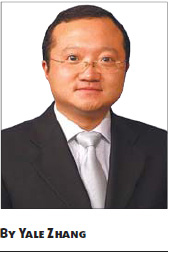

Nearly 6.1 million vehicles were sold in China in the first six months of 2009, an increase of 17.7 percent over the same period last year.
Sedan sales totaled 3.24 million units, an increase of 22 percent, while 102,500 MPVs were purchased, a drop of 8 percent, and SUVs accounted for 252,000 units, a rise of 12 percent.
The strong momentum is almost certain to ensure China finishes the year as the No 1 auto market in the world, maintaining the lead it took early this year. In the US about 9.6 million vehicles are projected to be sold in 2009.

Helped by several State policies released in January, demand surged after the first quarter, with the market easily growing by double digits from April to June. When June passenger car sales were reported by the China Association of Automobile Manufacturers, it became quite clear China is the fastest-growing market worldwide with an astounding 47 percent increase for the month.
Buoyed by a sales tax cut for small cars, the compact segment soared in the first six months, accounting for more than 46 percent of all car sales. Low-priced, entry-level vehicles made by local carmakers enjoyed the most growth.
BYD became a rising star with a growth rate of 176 percent to reach 176,814 units. Shanghai Auto sold 33,424 units, up 305 percent.
Much larger automakers Chery and Geely continued to grow as well, but at the industry average.
At the same time, China's vehicle exports slowed dramatically due to the global financial crisis and Chery and Geely registered reduced export sales.
The sales tax policy helped makers of small vehicles, but their profit margin is thin, so sales did not generate as much profit growth as expected.
New stimulus policies
The government launched new policies in July that encourage consumers to scrap older vehicles by providing a new car purchase subsidy of 3,000 to 6,000 yuan. In addition to helping ramp up sales, the policy is designed to improve air quality as older vehicles pollute more than today's cars with electronic fuel injection engines.
Although the policy is enlightened, the subsidy itself is not very attractive. Many older vehicles can be sold for more than 6,000 yuan on the used car market, so few owners are likely to scrap their old vehicles.
As well, car buyers cannot benefit from both the engine-size sales tax cut and the scrapping subsidy, so it actually encourages vehicle owners to buy vehicles with engines larger than 1.6 liters when scrapping their older vehicles.
Car financing was another important component affecting new car demand. In May and June, sales of mid-priced vehicles grew slowly, but upper-segment cars started to show strong momentum due a deep loan pool available beginning in early 2009.
Most vehicle loans are used in the higher-level segments, including purchases by business owners who take out loans for company cars, rather by individual or family car buyers.
Different opinions
There are differing opinions whether strong growth will continue in the second half of 2009. Industry insiders note that retail sales are traditionally slow in summer as consumers travel or avoid cities due to the heat. Most dealerships are located in suburban areas of large cities.
As well, the sales tax cut has been in effect for six months and its influence could fade over time.
Another factor is rising gasoline prices that could affect cost-sensitive buyers.
The overall economy has not yet recovered to reach the double-digit growth rates of the past two decades - China's GDP in the first half of the year grew about 7.1 percent, while exports dropped by 21 percent in June, the ninth monthly decrease in a row. As a result, demand in China's top car market Guangdong was flat in the first six months.
Yet sales in the second half of 2008 were very low, so monthly annualized growth can be expected. By the end of 2009, the car market - sedans, SUVs and MPVs - is expected to grow around 18 percent to 6.3 million units.
Compact segments will again take the lead in sales, while Volkswagen, General Motors and Toyota will remain China's top three carmakers.
Yale Zhang is the director of US auto industry consultancy CSM Worldwide Corp's Greater China operation
(China Daily 07/27/2009 page6)













